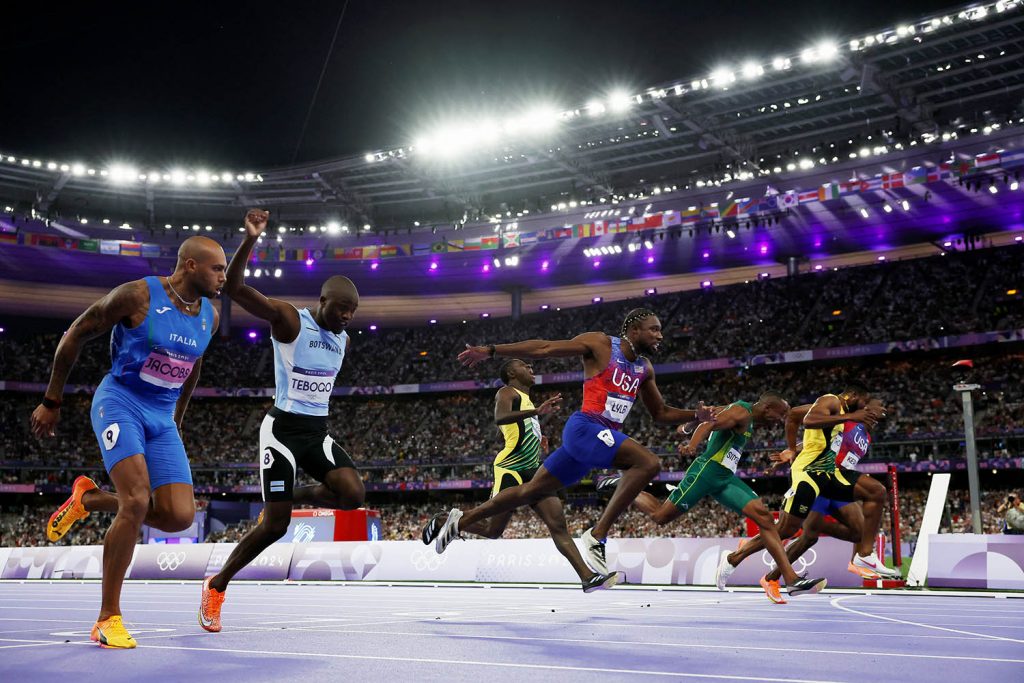
One of the greatest sounds in sport is the silence before the gun: the echoing hush as the crowd accepts that less than ten seconds after the gun has been fired, the fastest man in the world will be standing before them. We heard that gut-churning hush at the Stade de France last night before the final of the men’s 100 metres, when Noah Lyles of the United States beat Kishane Thompson of Jamaica by five thousandths of a second. It was a hush made by 77,000 people. At the last Olympic Games there was no such hush. Merely a silence. Lamont Marcel Jacobs of Italy outsprinted the rest in the Olympic Stadium in 2021 and there was silence before, during and after. The Tokyo Games, postponed for a year, were played out in deserted venues as the crisis of Covid continued. The world was deeply grateful for the distraction: but truly, these were the Haunted Games.
Audience matters in sport. Sport is a public act: the audience is what gives it meaning. You do it in public and the whole world witnesses your humiliations and, rather less often, your triumphs. In Woody Allen’s The Sleeper, Woody’s character is asked: “Do you want to perform sex with me?” “I don’t think I’m up to a performance, but I’ll rehearse with you if you like.”
Sport is a performance whether you are hitting a six on the village green or falling short by a thousandth of a second in the Olympic Stadium. The audience makes it so. As they do with a play or a concert, spectators change the nature of what’s happening. “It sucked,” said Lyles on the moments before the 200 metres final in Tokyo. “It’s usually the moment when I’m like, it’s showtime! But I was thinking this is not it, this is not fun, this is not cool...” He started favourite and finished third.
Was it the deathly hush at the Ariake Gymnastics Centre that caused the American gymnast Simone Biles, favourite to win everything, to suffer an acute attack of self-doubt and withdraw? Three and a bit years on, she’s back to her best and performing with brilliance and joy. And they’re cheering every move.
Paris has been full. There is action in existing, temporary and two relatively modest new facilities, a refreshing change from traditional megalomania.
- 80,000 spectators at the equestrian events at Versailles; temporary.
- 15,220 people at La Défense Arena and the swimming; existing.
- 5,000 at the Paris Aquatics Centre for the diving and water-polo; new.
- 5,000 at Le Bourget Climbing Venue; temporary.
There are also free events along the streets and the river. It’s reckoned that half a million watched the cycling road race. Next week brings long-distance open-water swimming over a 10km course in the Seine, and at the weekend the men’s and women’s marathon will be run from Paris to Versailles and back.
At the swimming the French literally cheered Leon Marchand at every stroke: each time his head emerged for a breath there was a unison roar: alleeez! Olympic crowds are almost always comfortable places, multinational with mixed loyalties and prepared to cheer a great performance from anyone. (The French made an exception for the Argentinian football team.)
At the London Games professional crowd-stirrers pleaded: “Make some noise!” But crowds serve no one with witless din. Rather they create a soundtrack that reinforces the action for both performers and spectators: the groan of disappointment as a horse dislodges a pole, the gasp of horror as a gymnast falls, the roar of triumph that greets every victory and the disbelieving hubbub as a world record is broken. You don’t go to a film to listen to the soundtrack, but if Hans Zimmer or John Williams were silenced, the film – well, it would probably suck.
Poor Tokyo. Paris has an audience: the Games are alive again.










